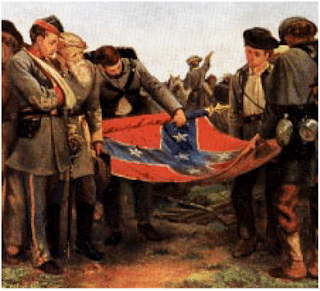Here in July 2023, I think it fitting to reflect on the worst idea the United States ever birthed, the Confederate States of America, by celebrating the month of July for what it represented. The irrevocable shattering of the Confederacy.
It is rare for one month to deliver such catastrophic body blows to a cause or war, with only perhaps the period of October-November 1812 for Napoleon’s Grande Armee in their invasion of Russia and June 1944 with the landing of the Allied armies in Normandy and the start of Operation Bagration in the East signaling the downfall of the Third Reich. In each case, of course, the enemy fought on. That was no different for the Confederacy. However, the shattering reverses were ones which could never be recovered from.
Before July of 1863, the Confederacy had been riding high. They had defeated two major invasions of Virginia, first under McClellan in 1862, and then again under Hooker barely a month prior. In each case Robert E. Lee’s Army of Northern Virginia managed to inflict a strategic defeat on the Union Army of the Potomac, causing the government in Washington significant embarrassment. After Lee’s victory at Chancellorsville, he felt his army could do anything he asked of them. It would be hard think otherwise! Even out west, despite a series of setbacks since 1862, Grant’s armies had been rebuffed at Chickasaw Bayou and his major overland expeditions against Vicksburg had all failed or been repulsed. Even through May, Grant’s armies traded victories, and his first efforts to storm Vicksburg were bloodily thrown back, leading to the expectation of a long, bloody siege.
So, when July 1863 began, the Confederacy had hopes of, if perhaps not outright military victory, then at the very least that they might force a favorable conclusion to the war. The Union meanwhile, while not disillusioned of victory, saw many bloody battles to be fought.
That was when Lee began his great invasion of the North in the Gettysburg campaign. He thrust forward and outfoxed the demoralized General Hooker who was then replaced by General Meade, a man who had never commanded the army and had to pick it up as it was racing to meet Lee. The resulting battle was by all accounts an accident.
Gettysburg is one of the most studied battles in American history. For a while, it was also fodder for alternate history stories. While I personally think its value as a “what if” is negligible, its drama for a battle is not! Three days of hard fighting done on a single field which forged some American legends and is probably well enough known that I won’t repeat the details here. Needless to say, it knocked Lee’s army back on its heels and inflicted losses it would not soon recover from! From an army of 75,000 men, Lee lost over a third of his strength, suffering over 25,000 casualties! The Union lost 23,000 men, but were the larger force on the field at the end of the day. The Confederacy had launched its last great invasion of the North.
Out west meanwhile, the next day after Lee withdrew from Gettysburg on July 4th, Grant announced the Siege of Vicksburg had concluded. Much against expectations, Grant’s forces had been bloodied, but they had worn down the defenders with superior firepower, and ensuring they were starved for food and ammunition. The Confederate Army of the Mississippi was starved into submission, and come the end of the siege, 29,000 men out of nearly 34,000 would lay down their arms. It was a body blow for the Confederate cause in the West.
Remarkably, the news got worse as on the same day that Vicksburg surrendered, an unsung campaign also forced the Confederacy to surrender an enormous amount of territory out West. While General Rosecrans has something of a mixed reputation, his victory of movement over Bragg’s army in the West was a genuine masterstroke of logistics and movement which inflicted perhaps as many as 4x the casualties on Bragg’s forces while driving the Confederacy from pieces of Tennessee they had occupied since the beginning of the war. It was a master stroke which often goes unacknowledged as Gettysburg and Vicksburg occurred at the same time. It did however, give much to celebrate!
These three victories effectively doomed the Confederate cause. In a bare week the Confederacy lost over 45,000 irreplaceable soldiers. Grant had completely severed the Mississippi River, cutting the Confederacy in two. Meade had bloodied the premier army of the Confederacy and made it so that Lee could never launch a coordinated invasion of the North again. Rosecrans had forced them to give up territory without a fight beyond minor skirmishing. The loss of territory and men pushed the Confederacy to its limits. Supplies from the west could not reach the armies fighting in the east, and anything the trans-Mississippi states needed would have to be scraped together from their own meager resources.
However, that was not the total end of the Confederacy. They fought on for nearly two more years. Only two months after the Tullahoma Campaign, Bragg would deliver a whiplash blow to Rosecrans, driving him back. In the East, the two armies exhausted at Gettysburg would snap at one another for months, but fail to inflict any significant blows. Lee would husband his resources, and prepare to fight into the bloody campaigns of 1864. While July of 1863 was not the end, it was certainly the deathblow to the Confederate cause.


